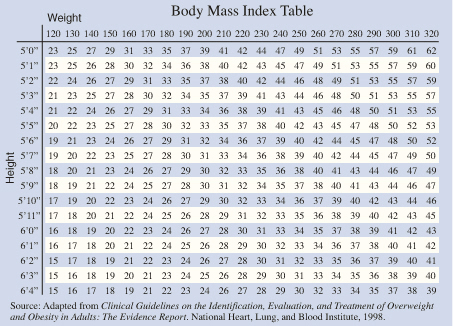Understanding Body Mass Index (BMI)
Body mass index (BMI) is a way to figure out your weight category. It uses the ratio of your height to your weight. BMI is a measure of your weight that is corrected for height. Knowing your BMI is a way to tell if you are at a healthy weight, underweight, or overweight. The higher your BMI, the greater your risk for weight-related health problems.
What BMI means for adults
-
BMI below 18.5: Underweight
-
BMI 18.5 to 24.9: Healthy weight or ideal body weight
-
BMI 25 to 29.9: Overweight
-
BMI 30 and over: Obese
-
BMI 40 and over: Severe obesity
Use a tool
Find your BMI with an online BMI calculator tool, such as this one from the CDC:
Using the BMI chart
To figure out your BMI, find your height and weight (or the numbers closest to them) on the table below. Follow each column of numbers to where your height and weight meet on the table. That is your BMI.

Online Medical Reviewer:
Jonas DeMuro MD
Online Medical Reviewer:
Marianne Fraser MSN RN
Online Medical Reviewer:
Raymond Kent Turley BSN MSN RN
Date Last Reviewed:
7/1/2022
© 2000-2025 The StayWell Company, LLC. All rights reserved. This information is not intended as a substitute for professional medical care. Always follow your healthcare professional's instructions.